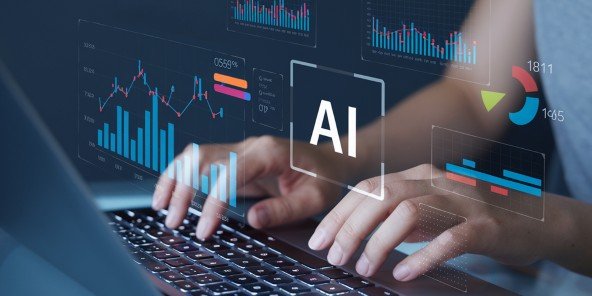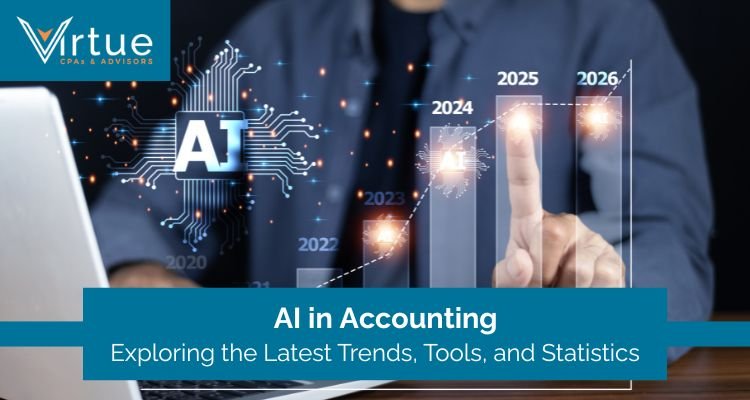The world of accounting is undergoing a profound transformation. What once involved endless manual data entry and complex calculations is now rapidly evolving with the integration of Artificial Intelligence (AI).
For small to mid-sized businesses, this isn't just a futuristic concept; it's a present-day reality that promises unparalleled efficiency, accuracy, and strategic insight. At Virtue CPAs, we understand these shifts and are dedicated to helping businesses like yours leverage the power of AI to optimize your financial operations and gain a competitive edge.
This comprehensive guide will explore the latest AI in accounting trends 2025, delve into essential tools, provide insightful statistics, and discuss how AI is shaping the future of AI in accounting.
What is AI in Accounting?
AI in accounting refers to the application of artificial intelligence technologies to automate, optimize, and enhance accounting and financial processes. Unlike traditional automation, AI systems learn from data, make intelligent decisions, and perform complex tasks that typically require human cognition.
Core AI Technologies Transforming Accounting Include:
- Machine learning (ML) for predictive data analysis
- Natural language processing (NLP) for document processing
- Robotic process automation (RPA) for repetitive task automation
- Computer vision for automated invoice scanning and data extraction
AI accounting software can process vast amounts of financial data at speeds impossible for humans, reducing errors by up to 90%, improving compliance, and freeing up CPA professionals for more strategic advisory work.
Why is AI Crucial for Modern Accounting?
AI accounting solutions directly address core challenges faced by modern businesses: speed, accuracy, and strategic insight amidst growing data volumes. Manual accounting processes are error-prone, time-consuming, and limit proactive financial advice capabilities.
Top 5 Benefits of AI for Small Business Accounting:
- 67% reduction in time spent on data entry and manual tasks
- 50% faster month-end closing cycles and financial reporting
- 90% more reliable financial reporting with automated error detection
- Proactive financial management with predictive analytics
- Early identification of cash flow issues and growth opportunities
This transformation allows businesses to move from reactive bookkeeping to proactive financial management, identifying problems before they impact cash flow.
What Are the Top 5 AI Accounting Trends in 2025?
The AI accounting landscape 2025 reflects rapid technological advancements and evolving small business needs. Here are the five key trends reshaping financial management:
1. Hyperautomation of Accounting Workflows
Hyperautomation combines AI, RPA, and machine learning to automate entire end-to-end financial processes, not just individual tasks.
What Gets Automated:
- Accounts payable processing and three-way matching
- Expense management with receipt scanning and categorization
- Financial statement preparation and variance analysis
- Payroll processing with tax compliance automation
For businesses using monthly accounting services or payroll services, this means 75% fewer manual inputs, 60% quicker turnarounds, and virtually eliminated human error risk.
2. Predictive Analytics for Strategic Financial Planning
AI-powered predictive analytics analyzes historical financial data to identify patterns, enabling powerful forecasting for strategic decision-making.
Predictive Capabilities Include:
- Cash flow forecasting with 85% accuracy up to 12 months
- Financial risk prediction and early warning systems
- Fraud detection with real-time anomaly identification
- Tax liability projections for better financial planning
Business consulting and CFO controller services leverage these insights to provide accurate forecasts and strategic growth guidance for Atlanta and Alpharetta area businesses.
3. Enhanced Fraud Detection and Compliance Automation
AI fraud detection uses pattern recognition to identify anomalies invisible to human analysis, flagging suspicious activities in real-time.
Advanced Security Features:
- Real-time transaction monitoring with instant alerts
- Strengthened internal controls with automated segregation tracking
- Automated compliance monitoring for tax regulations
- 30% reduction in financial fraud incidents
This translates to greater security and reduced compliance risk for clients, reinforcing financial operation integrity.
4. Conversational AI and Natural Language Processing
AI chatbots and virtual assistants powered by NLP streamline client interactions and provide 24/7 financial support.
NLP Applications for Accounting:
- Instant answers to routine financial questions
- Automated data retrieval from financial systems
- Software navigation guidance and troubleshooting
- Real-time financial report interpretation and analysis
5. AI-Powered Continuous Auditing
AI audit software enables comprehensive, continuous auditing processes, analyzing vast datasets and identifying anomalies that traditional audits miss.
Continuous Audit Features:
- 100% transaction analysis instead of sampling
- Real-time monitoring of internal controls
- Automated risk assessment and control testing
- 50% improvement in audit quality and efficiency
Ready to streamline your financial operations with AI? Schedule a Free Consultation Today with Virtue CPAs.
What Are the Best AI Accounting Tools in 2025?
The AI accounting software market offers diverse solutions leveraging various technologies for concrete business benefits.
1. Robotic Process Automation (RPA) Platforms
RPA accounting bots mimic human digital interactions for repetitive, rule-based tasks with 99.9% accuracy.
Top RPA Platforms for Accounting:
- UiPath for comprehensive workflow automation
- Automation Anywhere for scalable cloud-based solutions
- Blue Prism for enterprise-level implementation
Common RPA Applications: Invoice data entry, bank reconciliations, payroll processing, tax form preparation.
2. Machine Learning Accounting Software
ML algorithms learn from financial data patterns for prediction and classification tasks without explicit programming.
ML Applications in Small Business Accounting:
- Fraud detection through spending pattern analysis
- Predictive cash flow modeling and forecasting
- Automated expense categorization with 95% accuracy
- Vendor payment discrepancy identification
3. Natural Language Processing Tools
NLP accounting software extracts information from unstructured documents and powers conversational financial interfaces.
NLP Capabilities for CPAs:
- Contract analysis for revenue recognition compliance
- Legal document processing for financial implications
- Email content interpretation for financial commitments
- Automated document classification and filing
AI-Integrated Accounting Software for Small Businesses
Popular cloud accounting platforms now integrate AI capabilities directly, making advanced technology accessible to small businesses. .
Leading AI-Enhanced Accounting Solutions:
1. QuickBooks Online with AI Features:
- Smart transaction categorization with learning algorithms
- Receipt scanning and automated data extraction
- Predictive cash flow insights and alerts
- Automated sales tax calculations and filings
2. Xero AI Accounting Platform:
- Intelligent transaction coding suggestions
- Bank reconciliation automation with pattern recognition
- Real-time financial insights and trend analysis
- Automated invoice matching and approval workflows
3. Sage Intacct for Mid-Market:
- Advanced anomaly detection for financial irregularities
- Automated journal entries with approval workflows
- Enhanced financial reporting with drill-down capabilities
- Comprehensive audit trails and compliance monitoring
Traditional Accounting vs. AI Enhanced Accounting
| Feature | Traditional Approach | AI-Enhanced Approach |
|---|---|---|
| Data Entry | Manual, time-consuming | Automated via machine learning |
| Error Detection | Human audits | Real-time alerts and error flags |
| Forecasting | Based on historical data | Predictive analytics and scenario modeling |
| Compliance | Manual checks | Automated monitoring and alerts |
| Financial Advisory | Static reporting | Real-time insights for better decisions |
Explore Our Full Range of Services including Personal Tax, Business Tax, CFO/Controller Services, and more.
How is AI Transforming Small Business Accounting?
AI transformation fundamentally reshapes accounting roles and capabilities, especially for small businesses and the CPAs serving them in the Atlanta metro area.
1. Enhanced Efficiency and Cost Savings
AI accounting automation eliminates repetitive tasks, delivering 40-60% efficiency gains and significant cost reductions.
Tasks Now Automated by AI:
- Data entry and transaction processing
- Bank reconciliations and account matching
- Invoice processing workflows and approvals
- Tax form preparation and compliance checking
This means 50% more value from accounting budgets and 3x faster turnaround times on essential financial tasks.
2. Improved Accuracy and Error Reduction
AI accounting systems perform tasks with 99.5% accuracy once properly configured, leading to cleaner books, reliable statements, and 80% fewer costly mistakes.
3. Strategic Advisory Focus
With AI handling routine tasks, CPA professionals focus on higher-value activities including financial analysis, strategic planning, and proactive business advice.
4. Scalability for Growing Businesses
AI-powered accounting systems scale seamlessly with growing businesses, handling 10x transaction volume increases without proportional staffing increases.

What Does the Future Hold for AI in Accounting?
The future promises even deeper integration and sophisticated capabilities transforming the accounting profession.
1. Continuous Auditing and Real-time Financial Reporting
AI audit systems enable constant transaction monitoring for anomalies and compliance, leading to real-time financial reporting with minute-by-minute business insights.
2. Hyper-Personalized Financial Advisory
Sophisticated AI financial advisors will offer personalized recommendations tailored to unique business circumstances, industry trends, and growth goals.
3. Blockchain and AI Integration
Combining blockchain's immutable ledger with AI's analytical power enhances transparency, security, and traceability, potentially revolutionizing transaction advisory services.
4. Evolution of the CPA Profession
Modern CPAs evolve from data processors to strategic business advisors, requiring analytical skills, technological proficiency, and deep business strategy understanding.
AI in Accounting Statistics: 2025 Market Data
Current market research shows rapid adoption and significant business impact:
- 80%+ of routine accounting tasks will be automated by AI/RPA by end of 2025
- 45% average efficiency gains reported by small businesses adopting AI accounting
- 30% reduction in financial fraud for early AI adopters
- 25% projected annual growth in AI accounting software investment through 2027
- 65% of accounting professionals developing new AI and data analytics skills
These statistics underscore tangible benefits and the competitive imperative to embrace AI accounting technology trends.
Get a Personalized Quote for Virtue CPAs' Services tailored to your business's unique needs. Let us help you navigate the future of finance with confidence.
How to Implement AI in Accounting: Step-by-Step Guide
AI accounting implementation doesn't require overnight transformation. Strategic, phased approaches work best for small-to-mid businesses.
Phase 1: AI Readiness Assessment (Week 1-2)
- Audit current workflows for automation opportunities
- Evaluate existing software integration capabilities
- Assess team technology readiness and training needs
- Identify high-impact automation candidates
Phase 2: Pilot Implementation (Month 1-2)
- Start with basic RPA for data entry automation
- Implement AI-enhanced QuickBooks or Xero features
- Automate bank reconciliations and invoice processing
- Monitor results and gather user feedback
Phase 3: Scale and Optimize (Month 3-6)
- Expand to complex applications like predictive analytics
- Integrate advanced AI features across all accounting functions
- Train team on AI tools and strategic analysis skills
- Measure ROI and optimize configurations
Conclusion: Embrace the AI Accounting Revolution
AI integration represents a fundamental shift redefining efficiency, accuracy, and strategic insight for businesses of all sizes. Embracing AI accounting trends 2025 is essential for competitiveness, cost reduction, and informed decision-making in today's digital economy.
At Virtue CPAs, we are at the forefront of this AI transformation in accounting. Our team specializes in addressing the unique accounting and tax needs of small and mid-sized businesses, seamlessly integrating cutting-edge accounting technology trends with our comprehensive services, including Monthly Accounting Services, Business Tax, CFO/Controller Services, and QuickBooks Service.
Don't let the complexity of emerging AI technologies deter you. Partner with Virtue CPAs to leverage the power of AI, streamline your operations, and secure a more prosperous financial future.
Transform Your Accounting Today: Call: (678) 952-9001 or email info@virtuecpas.com






